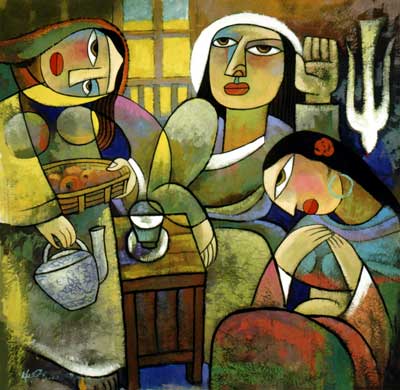NB: I don't usually post funeral sermons but a lot of people have asked for a copy. Plus I'm sure Dorothy wouldn't mind.
It’s hard to imagine a world and a church without Dorothy, isn’t it? Like most of you I’m still trying to wrap my head around the fact she’s died. After all, she’s been around this church since the beginning. She’s one of the signatories on the papers making Lutheran Church of the Good Shepherd an official congregation. She helped build this church.
And some of you knew Dorothy from before your involvement at Good Shepherd or outside the church. You knew her from around town, or from the various other places she lived.
And whether you knew her from church or not, she was the same Dorothy. And she commanded respect from everyone she met.
Many of us know her from her reading of Psalm 22 - from the recording we just heard. Her particular reading of this psalm every Maundy Thursday as we strip the altar in preparation for Good Friday has transcended mere tradition and eased into the realm of being an institution.
Psalm 22 on Maundy Thursday was Dorothy’s terrain. And she took this responsibility seriously. No matter how many years she read it or how familiar the psalm was to her, she always took the big bible home during holy week to practice. She wanted the words planted firmly in her mouth so she could speak God’s Word with expression and integrity.
Each year she get up behind the pulpit, pause, look out into the congregation, slightly furrow her brow, breathe deeply, and say:
“My God, my God, why have you forsaken me?”
Of course, I can’t read it the same way that Dorothy could. Very few people can. Most of us lack the gravitas that comes with the life experience that make those words so tragically real. Many of us aren’t able to know what that opening phrase really means. We haven’t experienced them. At least not as deeply as others have.
“My God, my God, why have you forsaken me?”
Those words from psalm 22, as many of us know, were among the last words Jesus uttered from the cross. And it has puzzled people as to what he meant by them ever since. How could God’s only Son, the Word made Flesh, the image of the invisible God, feel like God had forsaken him? Wouldn’t such a declaration demonstrate a weak faith? Would quoting the first lines from this psalm betray a heavy hopelessness, a sense of being actively abandoned by God, a disturbing suggestion that God might - and does - leave us alone when we need God the most.
It sounds like desperation, the cry of someone proclaiming the hopelessness of life.
So, some of you might object and say, “This psalm is not Dorothy. She wouldn’t spend her time complaining about what she doesn’t have. She wouldn’t waste her energy whining about how cruel the world was. Dorothy wouldn’t worry about what others thought of her. She lived life on her own terms. She set her own standards. She was a strong, independent woman. She was NOT weak and helpless.
“Dorothy knew what life was and what life wasn’t. The words from this psalm would not have come from Dorothy, even though she went through tough times. Hopelessness was not part of her make-up. Helpless she was not.”
“My God, my God, why have you forsaken me?” No, that’s not the Dorothy I know.
Or maybe, those words from the psalmist gave voice to what Dorothy couldn’t say herself. She read this psalm with too much personal expression for the words not to be her own.
It’s as if she knew in bones what those words meant for her. She knew that life could be hard. She didn’t expect life to be fair. Her eyes were wide open to challenges and hardships. She knew pain and tragedy.
Despite her considerable strength of character, she read these words with too much authenticity for them not to ring true somewhere in the quietness of her heart; hidden in her darker moments:
“My God, my God, why have you forsaken me?”
But she didn’t finish the psalm there either in church or in life. She read through to the end of the psalm. She knew that beyond the psalm’s beginning; the cries of pain, the laments, the grievances, the injustices, she, like the psalmist, ultimately trusted in God’s promises for a new and better tomorrow. She never gave up on a world that she knew that God loved. She never gave up on God or on others.
“I will tell of your name to my brothers and sisters; in the midst of the congregation I will praise you: you who fear the Lord, praise him!”
This is where Dorothy’s story and God’s story connect. She knew that God was found among people; in the midst of the congregation. She knew that we can’t be Christians without each other. That we need one another to grow, to be challenged, to be comforted.
She knew that living a life that mattered meant living a life in praise to God and in service to others. She knew that in praise and service she touched God’s future. She was a living promise to how God would finally fulfill all of God’s promises.
“To God, indeed, shall all who sleep in the earth bow down; before God shall bow all who go down to the dust, and I shall live for God. Posterity will serve God; future generations will be told about the Lord, and proclaim his deliverance to a people yet unborn, saying that God has done it.”
That was the final word for Dorothy. A word that looked not to the past, but into the future. Dorothy had a deep sense of what could be.
She never lost her vision of the future, and the future was always filled with good things. She expected tomorrow to be better than today. She could see that God was still creating a world that was new and beautiful. And she wanted to be a part of that new and beautiful world.
She once complained to me that our church too often settles for second best. That we think that, somehow, we don’t deserve what other churches have, or what we have in our houses. That our church can be, to use a cliche, penny wise and pound foolish. That we worry about the cost of things without considering its value.
What she seemed to want from us and from our church was to remember and know that we ARE valued, that we ARE loved, that each one of us here is chosen for good things in this world.
There may be times when we cry out the words at the beginning of the psalm, but, at the end, God will bring about the new and promised future; and we can look to that future with hope, we can proclaim God’s kingdom of love with our lives. That was Dorothy’s life’s message. That was the faith that sustained her.
Today, Dorothy can see that her faith has not been in vain. She has made it to the end of the psalm. She in basking in God’s future, she is resting in God’s shade tending the flowers that grow around the tree of life, she is singing God’s praise in the midst the great congregation, she is worshipping with all the families of the nations.
So, it looks like this psalm is Dorothy after all. Like Jesus on the cross taking on the sin and brokenness of the world, crying out the first words of the psalm on humanity’s behalf, but also looking forward to God’s resurrection future, Dorothy finishes the psalm with Jesus in a swirl of triumph, proclaiming the goodness and faithfulness of God, from the midst of pain and death into the glorious resurrection that comes to all God’s people - and indeed, the whole world.
May this be so among us. Amen.





